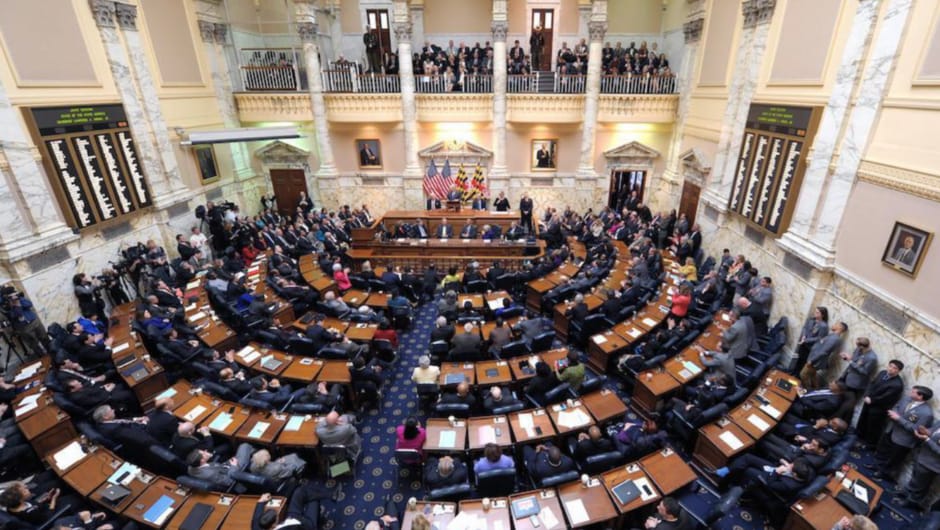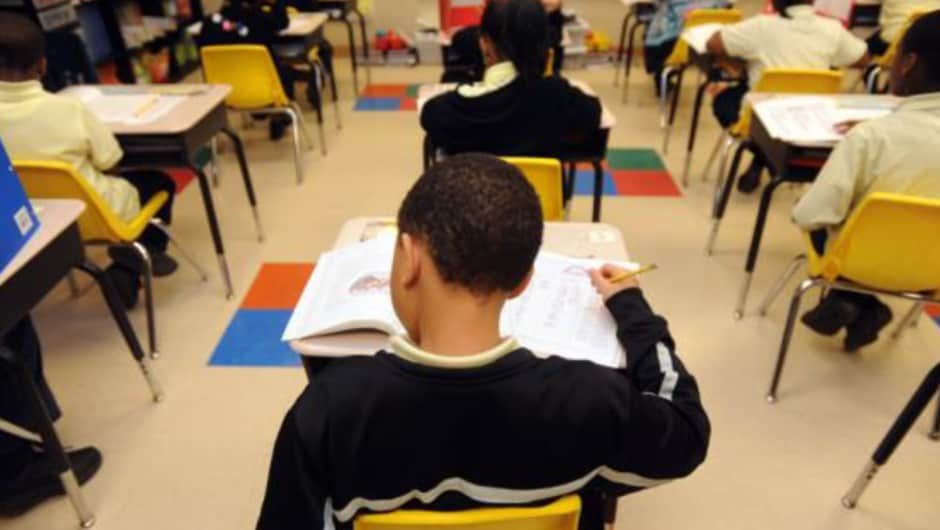Peter Jennings Award Winners Work to Realize the Blueprint for Maryland’s Future

Recognizing Potential
In 2016, the State of Maryland faced an education funding formula that had not changed in nearly 15 years, and legislative leaders and advocates felt the state was falling behind those with similar resources. In response, the Maryland General Assembly created the bipartisan Kirwan Commission, with the purpose of setting a standard for education across the state and preparing students for life beyond the classroom.
The Commission’s recommendations called for billions of additional dollars to fund PreK through 12 initiatives like expanding career and early education programs, increasing salaries and support for teachers, and providing additional resources to schools with high concentrations of poverty—the sort of recommendations that often result in splashy headlines and few actual policy changes.
But several Teach For America alumni worked to take action, championing legislative and grassroots efforts in parallel paths for “The Blueprint for Maryland’s Future”—legislation based on the Kirwan Commission’s recommendations that supporters say will have a transformative impact on education in the state for years to come.
Leading Awareness for Positive Action
Teach For America alumni including Shannen Coleman Siciliano (Baltimore, '03), Joe Francaviglia (Baltimore, '11), Taylor Stewart (Baltimore, '07), and Shamoyia Gardiner (Jacksonville, '14) joined Strong Schools Maryland (SSM) to advocate for The Blueprint for Maryland’s Future, building a statewide community of advocates in the process. The group was cognizant from the beginning they were fighting an uphill battle by advocating for change.
“The political will [to adopt the recommendations] was not there, or anywhere close to being there,” says Joe Francaviglia, who was executive director of Strong Schools Maryland during the organization’s advocacy for the law. “But the proposal meant new systems and life-changing money for school districts. And this was not going to happen if we didn’t do what we needed to do.”
“People were saying that education was a losing issue statewide,” recalls Taylor Stewart, a member of Strong School Maryland’s advisory council and the former vice chair of the group’s executive committee. “We had to help overcome this idea that education was a losing political issue in Maryland.”
To help voice the positive impact The Blueprint for Maryland’s Future would have in communities across the state, Strong Schools Maryland built a coalition of more than 50 other organizations to build grassroots support for the recommendations including, Francaviglia says, “many organizations that normally don’t talk to each other.”
The group trained grassroots leaders throughout the state, educating them about the nuances of the proposed legislation, keeping them apprised of new developments, and supporting them as they rallied support within their local communities.
“Our team leaders received monthly curriculum packets, because it was so sweeping and there was so much information,” says Shannen Coleman Siciliano, who was co-executive director of Strong Schools Maryland from 2017 to 2019. “It was not just, 'We’re asking you to show up for a rally.' It was, 'We’re asking you to meet monthly, ask questions, and think through this [proposed] legislation.'”

William “Brit” Kirwan, former chancellor of the University of Maryland system and the commission’s namesake, praises the alumni group’s efforts and says their advocacy was instrumental in swelling public support for The Blueprint for Maryland’s Future. Kirwan, who is not a TFA alum, says, “I’ve rarely, if ever, seen anyone who brought the energy, thoughtfulness, and organizational capacity this team brought to this effort. Strong Schools had teams in every school district in the state who were writing letters to their local officials. They organized busloads of people to come and walk the halls of the General Assembly. They filled up the hearing rooms. They provided testimony. They were just omnipresent at all the critical moments.”
“It was about being everywhere all the time, and making the Blueprint the number-one issue,” says Francaviglia. “When legislators would leave Annapolis, they could not escape us, because we had champions across the state.
Leading Legislation for Positive Impact
Meanwhile, TFA alumni Bill Ferguson (Baltimore, '05) and Ross Seidman (Baltimore, '15) were working within Maryland’s state legislature, leading efforts to turn the Kirwan recommendations into policy. In 2019, with public support for The Blueprint for Maryland’s Future growing in communities throughout the state, the Maryland General Assembly made progress by voting to fund the first year of implementation.
Ferguson credits the work his fellow TFA alumni were doing in communities across Maryland with creating a ripple effect felt by policymakers within the walls of the state capitol. Grassroots community awareness created a swell of public support for The Blueprint for Maryland’s Future while Ferguson and other supporters were fostering political will within the General Assembly to fund the first year of implementation. “That’s where Strong Schools was incredibly helpful,” he says. “Politicians were feeling this pressure, that we had to demonstrate a commitment to this.”

In the months following, while Strong Schools Maryland led a relentless advocacy campaign on the ground, Senator Ferguson and other members of the General Assembly worked apart from the grassroots organization to realize a “once-in-a-generation” opportunity to embrace educational excellence in the state. And, in 2020, Maryland state legislature voted overwhelmingly in favor of a multi-year, multi-billion dollar plan to implement the Blueprint law.
For Ferguson, one of the most important pieces of the new legislation is the allocation of significant additional resources to high-poverty schools. “The escalator that we included is a major philosophical change to the way we think about education,” he says. “That component will have one of the biggest impacts because it recognizes that the supports needed are exponential, not linear.”

Different Paths to Achieve One Goal
The Blueprint law addresses five major areas of concern: early childhood education, high-quality teachers and leaders, college and career-readiness pathways, additional resources for schools with high concentrations of poverty, and governance and accountability.
It will fund universal pre-school, making Pre-K free for three- and four-year-olds from low-income families, with Pre-K programs available to other families on a sliding scale. The law also calls for a new curriculum, benchmarked against international standards, with the aim of 90 percent of kids in the state being college and career ready by the tenth grade.
Teacher preparation is also revamped by the law, Kirwan says, with “much higher” standards for certification – “much more like you see with law school and engineers” – and a salary structure under which teachers will receive pay comparable to professionals in other fields that require a similar level of education.
Many of the projected positive impacts of the legislation will unfold over the next several years as it is implemented fully. But supporters are confident that the law will be transformative for students across the state, partly because it includes provisions for governance and accountability.

Supporters also say that students have already felt an impact through the early funding that was approved before the adoption of the full Blueprint law. Those funds more than doubled the number of “community schools” in the state (those receiving funding for a community coordinator and associated programming) from around 50 community schools to 125.
“It is important to note how profound the recommendations were, in that they basically called for a totally new system of education in Maryland,” says Kirwan speaking of the Blueprint law. “It was really a transformational change in how Pre-K through 12 is done in the state...and enormously difficult to pull off because there were vested interests that were losing some of their authority and control. That sounds pretty boastful, but there are testimonials from state superintendents all around the country who have basically said the same thing. This was a monumental undertaking.”
As an organization focused on leading independent advocacy, Strong Schools Maryland is not partnered, formally or informally, in any capacity with the Maryland General Assembly (MGA) and does not have any involvement in the formal legislative process in the State of Maryland. This article mentions TFA alumni affiliated with the MGA (Ferguson; Seidman) solely to contextualize the advocacy work done by TFA alumni involved with Strong School Maryland and its partners (Francaviglia, Gardiner, Siciliano, Stewart) in support for The Blueprint for Maryland’s Future. Ross Seidman and Senator Bill Ferguson have not accepted or directed any money associated with this award.


